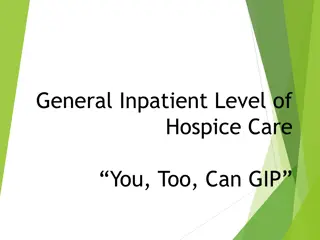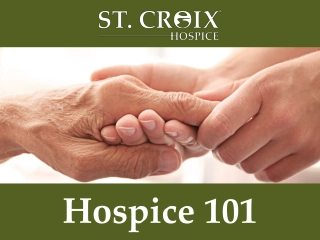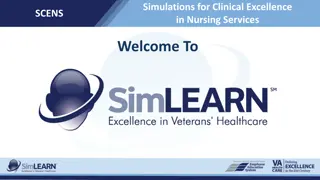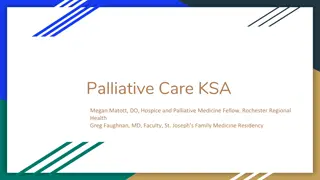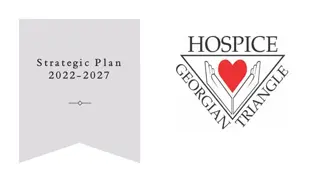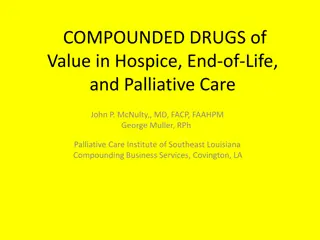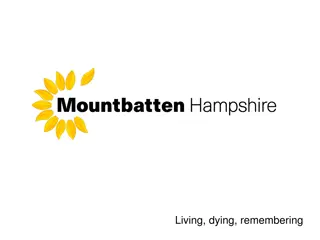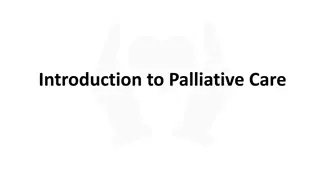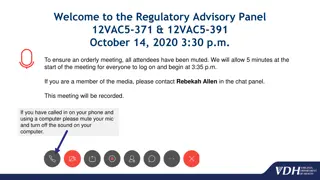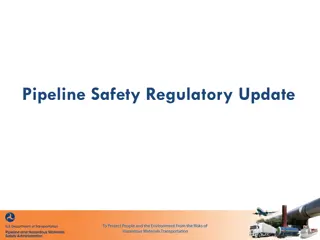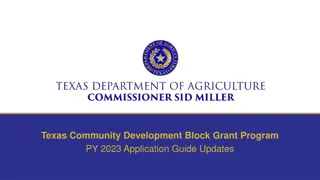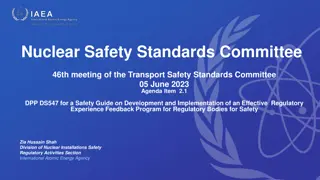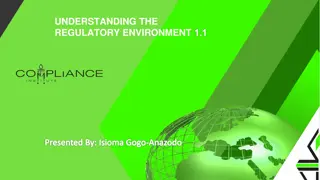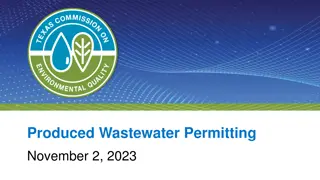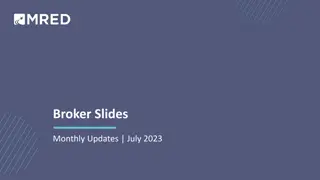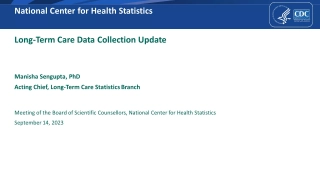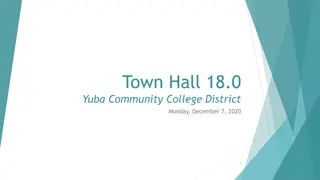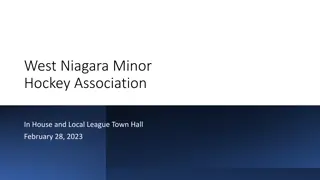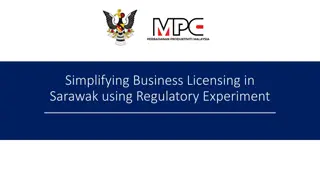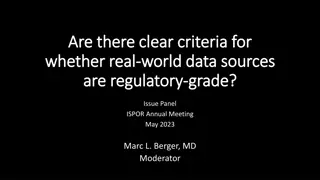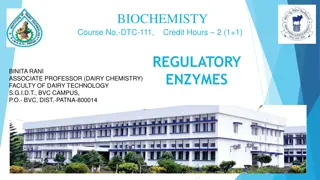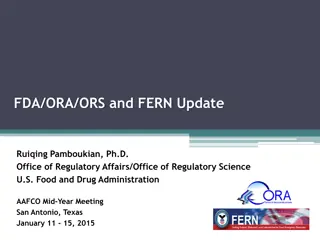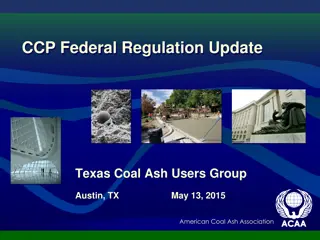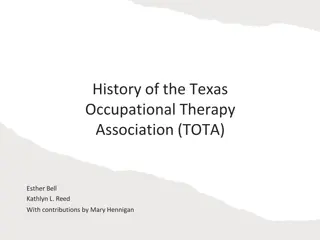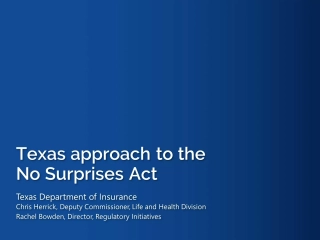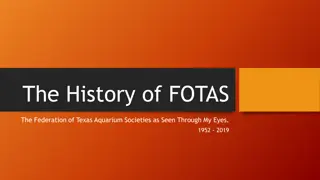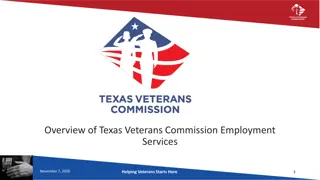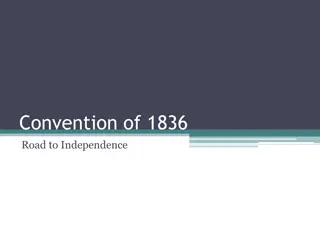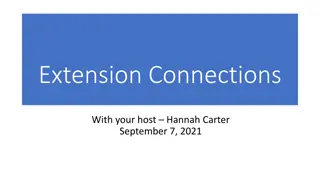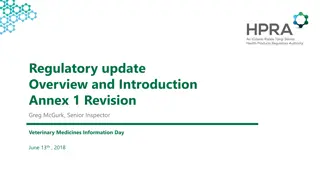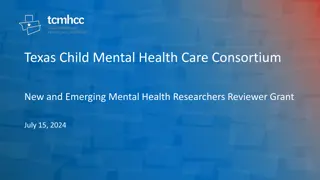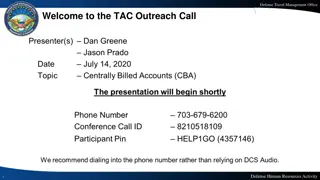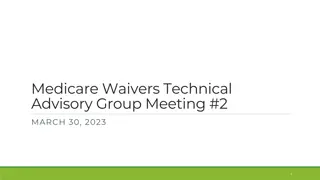Texas Association For Home Care & Hospice Regulatory Updates July 2023
HHSC has announced regulatory updates for Electronic Visit Verification (EVV) requirements for Medicaid services in Texas starting January 1, 2024. Providers must transition to the new vendor system, HHAeXchange, by October 1, 2023. The updates also cover the application process for becoming an HHSC-approved Proprietary System Operator and proposed rule revisions for Chapter 558 Licensing Standards.
Download Presentation

Please find below an Image/Link to download the presentation.
The content on the website is provided AS IS for your information and personal use only. It may not be sold, licensed, or shared on other websites without obtaining consent from the author. Download presentation by click this link. If you encounter any issues during the download, it is possible that the publisher has removed the file from their server.
E N D
Presentation Transcript
Texas Association For Home Care & Hospice Regulatory Updates July 2023
HHSC Electronic Visit Verification (EVV) Updates EVV is required for Medicaid personal care services (PDF) and will be required for Medicaid home health care services (PDF) starting Jan. 1, 2024. EVV Contract Awarded to Accenture and HHAeXchange Accenture s responsibilities will include: Providing and managing the new, single, state-funded EVV vendor system provided by HHAeXchange. Reviewing and approving EVV proprietary systems. Coordinating EVV system integration with the EVV Aggregator. Providing operational and technical support for the functions listed above.
HHSC Electronic Visit Verification (EVV) Updates - continued Next Steps and Timeline for Transition- Providers must transition to HHAeXchange or receive approval as an EVV Proprietary System Operator by Oct. 1, 2023. Reference the notice, Next Steps and Timeline for Transition to New Electronic Visit Verification Vendor System Includes information on: EVV requirement Transition to HHAeXchange by Oct. 1, 2023 Proprietary systems HHAeXchange Information Sessions HHAeXchange Provider Onboarding Form EVV Policy updates HHAeXchange System Training Access to the HHAeXchange Portal Contact information and other resources
HHSC Electronic Visit Verification (EVV) Updates - continued EVV Proprietary Systems Operators Providers that would like to become HHSC-approved PSOs can apply by submitting a Proprietary System Request Form. The request form is located on at: https://www.tmhp.com/topics/evv/evv-proprietary-systems Providers on the waitlist as of Friday, June 23, 2023, will participate in the expedited PSO onboarding session planned between July 15 through Aug. 31. Providers who submitted a request after June 23, and are not approved for this Expedited Path ORR session, are required to onboard with HHAeXchange. For additional information for current EVV users, reference the notice EVV Vendor Transition Overview (PDF) or go to the HHSC EVV Webpage. Additional Notices: July 17, 2023 Upcoming EVV Alternative Device Policy; and July 14, 2023 Register for Initial EVV Policy Training Webinar for Program Providers and FMSAs.
Chapter 558 Licensing Standards Draft Proposed Rule Revisions On April 17th, HHSC published proposed draft rule revisions to the Chapter 558 Licensing Standards. The proposed rules included significant changes to the Administrator Responsibilities and Supervising Nurse Conditions, as well as some other major rule changes. Some of these changes included: Administrator changes include a 2 license minimum cap on administration of an agency; that administrators must be physically present in the office at least 5 days a week for at least 2 hours a day; requires a separate removal process for administrators who are deemed ineffective in their designated role; adds administrator evaluation requirements; and adds topic requirements for administrator continuing education. Verification of employability and use of unlicensed persons is further defined as employees, volunteers, and contractors. It requires agencies to run EMR, NAR, and a criminal history checks on all unlicensed persons and specifies that the background checks must include all known aliases and states of residence. Modernizes medical record maintenance to include electronic records. Allows supervisory visits and some competency assessments to be done virtually as long a client needs and staff compliance needs are met. Adds practioner to definitions, which confirms the practitioner s ability to oversee the client s healthcare, condition, and treatment. Adds the allowance of teleservices, including telehealth, telemedicine, telemonitoring, and telecommunications which are all defined as separate services under the teleservices umbrella. Further clarifies RN delegation and Health Maintenance Activities in both the definitions and in standards specific to PAS agencies. Adds PPE requirements to training and education for both Administrator and agency staff, to client care policies (558.281), QAPI (558.287), Standards specific to LHH (558.401), Standards specific to PAS (558.404), Home Health Aides (558.701)
Medicaid Proposed Rules On April 27, 2023 CMS dropped multiple proposed rules that will significantly impact the Medicaid program if finalized. The Medicaid Access rule is the most impactful to the Medicaid Home and Community-Based Services (HCBS) program. The most troubling part of this proposed regulation is that CMS proposes to require that no less than 80% of all Medicaid payments, including but not limited to base payments and supplemental payments, be spent on compensation to direct care workers for the following services: homemaker services, home health aide services, and personal care services. This requirement would apply to services delivered under sections 1915(c), (i), (j), (k), and 1115 of the Social Security Act as well as those delivered through managed care contracts. Notably, it would not apply to 1905(a) State plan personal care and home health services. The requirement would be effective 4 years after the effective date of the Final Rule, or the first managed care plan contracting period that begins on or after 4 years following the effective date of the Final Rule. Medicaid Program; Ensuring Access to Medicaid Services Medicaid Program; Medicaid and Children's Health Insurance Program (CHIP) Managed Care Access, Finance, and Quality
Home Health CY 2024 Proposed Rule On June 30, 2023, CMS dropped the Home Health CY 2024 Proposed Rule. This proposed rule would: Propose a permanent, prospective adjustment to the CY 2024 home health payment rate to account for the impact of the implementation of the Patient-Driven Groupings Model (PDGM). CMS estimates that Medicare payments to HHAs in CY 2024 would decrease in the aggregate by 2.2 percent, or $375 million compared to CY 2023. The proposal also includes a 5.653% permanent rate cut along with the 2.2 percent decrease. Provide information on home health utilization trends and solicits comments regarding access to home health aide services; Implement home health payment-related changes; Rebase and revise the home health market basket and revise the labor related share; Codify statutory requirements for disposable negative pressure wound therapy (dNPWT); Implement the new items and services payment for the home intravenous immune globulin (IVIG) benefit. Additionally, it proposes-- changes to the Home Health Quality Reporting Program (HH QRP) requirements and the expanded Home Health Value-Based Purchasing (HHVBP) Model; to implement the new Part B benefit for lymphedema compression treatment items, codify the Medicare definition of brace, and make other codification changes based on recent legislation; to add an informal dispute resolution (IDR) and special focus program (SFP) for hospice programs; to codify DMEPOS refill policy; and to revise Medicare provider and supplier enrollment requirements.
End of the Pandemic The HHSC Emergency Rule (558.960) was allowed to expire so effective 6/24/22, providers are no longer required by rule to perform screenings. This only effects the requirements set by the emergency rule (screenings, essential vs. non-essential visits). This has nothing to do with overall infection control protocol (PPE, Isolation, Quarantine, etc.) and prevention of spread guidance. Please remember that screenings can still be used as a method to prevent spread, but they are not required daily and are no longer required to be documented. Providers are urged to continue screenings when a patient or employee presents with symptoms or reports an exposure. The agency is still held responsible for infection control, and that includes preventing spread. No more screening? With the HHSC HCSSA Emergency Rule expiring and the OSHA Healthcare ETS suspended, it eliminates the requirement to perform screenings. However, even though screenings are no longer required by rule, HHSC has stated that infection control and prevention remains the responsibility of the provider. This means that providers should continue to monitor infection levels within their community, continue to follow the CDC recommendations, and continue to implement precautions as necessary to prevent spread. Agencies can continue the screening process by choice (and policy) as an IC precaution; meaning they can continue to perform full screenings, or just perform screenings when an employee or patient presents with new symptoms. They should also continue to ensure appropriate PPE is used as applicable, and continue to isolate/quarantine per the CDC recommendations. You must continue to report positive cases to your LHD or DSHS. Reporting was never required by the HHSC emergency rule, but rather the Texas Health and Safety Code, 81.042 (e)(4) and HCSSA licensing standards (26 TAC, 558.285 (1)(A)), which both require providers to report communicable diseases to their local health entity or DSHS.
End of the Pandemic Cont. Details about continuing OSHA Requirements are as follows: Back in December 2021, the OSHA Healthcare ETS was suspended and providers no longer were required to follow 99% of the rule. The only parts of the ETS that continued to be required were the record-keeping portions, specifically the COVID-19 plan and the Reporting requirements. All other parts of the rule were suspended and not enforceable. Shortly after, OSHA came back and said that all HC providers/employers were still required to follow the OSHA general duty clause and its general standards, including the Personal Protective Equipment (PPE) and Respiratory Protection Standards. At this same time, OSHA said continued adherence of the precautions related to infection control in the OSHA Healthcare ETS would be the easiest way to meet the requirements of the GDC and the general standards. With OSHA, under the General Duty Clause, employers are expected to furnish to its employees with "employment and a place of employment which are free from recognized hazards that are causing or are likely to cause death or serious physical harm to his employees..."Employers can be cited for violation of the General Duty Clause if a recognized serious hazard, such as COVID-19, exists in their workplace and the employer does not take reasonable steps to prevent or abate the hazard. The General Duty Clause is used only where there is no standard that applies to the particular hazard. The following elements are necessary to prove a violation of the General Duty Clause: The employer failed to keep the workplace free of a hazard to which employees of that employer were exposed; The hazard was recognized; The hazard was causing or was likely to cause death or serious physical harm; and There was a feasible and useful method to correct the hazard.
CMS Vaccine Mandate On May 31, 2023, the Centers for Medicare and Medicaid Services (CMS) announced a final rule, Medicare and Medicaid Programs; Policy and Regulatory Changes to the Omnibus COVID-19 Health Care Staff Vaccination Requirements; Additional Policy and Regulatory Changes to the Requirements for Long-Term Care (LTC) Facilities and Intermediate Care Facilities for Individuals With Intellectual Disabilities (ICFs-IID) to Provide COVID-19 Vaccine Education and Offer Vaccinations to Residents, Clients, and Staff; Policy and Regulatory Changes to the Long Term Care Facility COVID-19 Testing Requirements. This rule will be effective 60 days after it is published in the federal register, which is scheduled to happen on June 5, 2023. CMS will not be enforcing the staff vaccination provisions between now and the effective date of this final rule. CMS COVID-19 Vaccine Regulatory Changes CMS is withdrawing all requirements to vaccinate staff for COVID-19. CMS is finalizing the requirement from the COVID-19 Vaccine Educate and Offer rule which maintains requirements for providers to educate staff and patients about, and offer, the COVID-19 vaccine. Once the rule is effective, the COP's under 484.70 (d) infection control for home health; and under 418.60 (d) infection control for hospice will be updated.
End of Medicaid Continuous Enrollment HHSC will stagger Medicaid redeterminations over multiple months. Continuous coverage population will be distributed into three cohorts; Redeterminations will be initiated for each cohort in consecutive months at the start of the unwinding period. The first Cohort Group includes individuals most likely to be ineligible or transitioned to CHIP: Women who were pregnant who may transition to the Healthy Texas Women Program; Members who aged out of Medicaid; and Adult recipients who no longer have an eligible dependent child in their household. Members in this Cohort Group will have already received or started receiving renewal packets or requests for information in April with 30 days to respond. The second Cohort Group includes individuals likely to transition to a different Medicaid eligibility group: Medicaid children, parent/caretaker and waiver groups pending information; and Certain MAGI population groups (e.g., women aging out of Children's Medicaid, people under Transitional Medical Assistance). Members in this Cohort Group will start receiving renewal packets or requests for information in July with 30 days to respond. The third Cohort Group includes everyone remaining from the previous groups, including those most likely to remain eligible (i.e., older adults and people with disabilities). Members in this Cohort Group will start receiving renewal packets or requests for information in September with 30 days to respond. If the client/patient is able, now is the time to create an account on yourtexasbenefits.com. HHSC has implemented an online password reset capability for those who have an account but cannot get in due to password issues. Actions Providers Can Take Now Download Ambassador Toolkit from https://www.hhs.texas.gov/services/health/coronavirus-covid-19/end-continuous-medicaid- coverage-ambassador-toolkit; Review the HHSC End of Continuous Medicaid Coverage FAQ s. Visit www.hhs.texas.gov/update Join the Ambassador Program email list Ambassador Program Contact List



